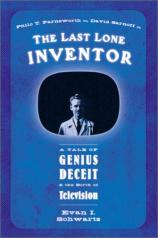Reading Group Guide
Discussion Questions
The Last Lone Inventor: A Tale of Genius, Deceit, and the Birth of Television

1. How do you think Philo Farnsworth felt as a teenage farm boy in Idaho when he brainstormed the principle for electronic television? How do you think he felt when he confided to his father and his father said to keep the idea quiet because "everyone already thinks you're a little odd." What drove this kid to pursue his idea so passionately? Have you ever had a new idea that no one around you would understand? What did you do about it?
2. Why did David Sarnoff feel so compelled to fabricate some of the early events of his life and make them more dramatic? Was he truly a visionary who foresaw the future possibilities of broadcasting before anyone else? What do you think of his tactics for rising through the ranks at RCA and for advancing the interests of RCA in the communications industry? Were his actions simply typical of what goes on in many corporations today?
3. Was Farnsworth lucky or unlucky? Was he fortunate to meet the people and raise the money he did? Or should he have been able to raise more money to fund such a revolutionary invention? Could he have achieved all he did without the efforts and loyalty of his wife Pem?
4. Was Farnsworth foolish? Was it unrealistic of him to try and go it alone and try to become the Thomas Edison of television? Should he have allowed television scientist Vladimir Zworykin to visit his laboratory for three days, knowing Zworykin could be a potential rival? Should Farnsworth have accepted the buyout offer from RCA's David Sarnoff and simply have gone to work at RCA Laboratories as a staff engineer like Zworykin?
5. Was Sarnoff foolish? Should he have offered more money to buy out Farnsworth and his patents? Would Sarnoff have been better off licensing Farnsworth's patents at the outset instead of fighting the inventor in patent court for years? Why did Sarnoff choose this more difficult route?
6. Why do you think Farnsworth disassociated himself from television just as television was sweeping the country? Why did he put all his efforts into his fusion research? Was it a mistake for him to switch to a new field of invention?
7. What are the parallels in the story that you see in our current time? Does RCA's antitrust troubles remind you of the plight of a certain modern day company? Are today's dominant corporations more or less arrogant than they were back then? What are the parallels between the early days of radio in the 1920s, the early days of television in the post-War era, and the early days of the Internet in the 1990s?
8. What is the significance of the Albert Einstein quote at the beginning of the book: "Anything that is truly great or inspiring is created in the mind of one individual laboring in freedom?" How does Farnsworth view Einstein, and what role does Einstein play in the story?
9. Do you think we will see a resurgence of lone inventors, in the mold of Bell, Edison, the Wright Brothers, and Farnsworth, or are famous independent inventors a thing of the past? How do new ideas come about in your company or in your industry? What kind of individuals come up with the best new ideas? How do you or others react to new ideas when you first learn of them?
10. What do you think was the most influential invention of the 20th century: the automobile, the airplane, the television, the computer, or something else? How do you justify your choice?
The Last Lone Inventor: A Tale of Genius, Deceit, and the Birth of Television
- Publication Date: May 7, 2002
- Hardcover: 336 pages
- Publisher: Harper
- ISBN-10: 0066210690
- ISBN-13: 9780066210698







